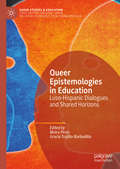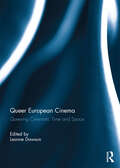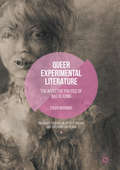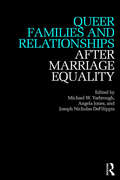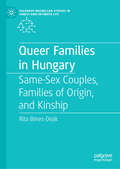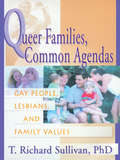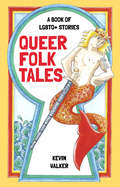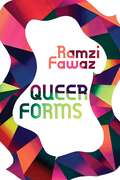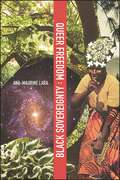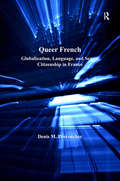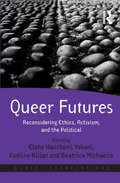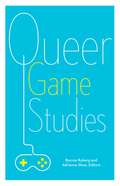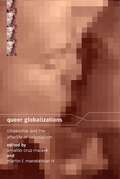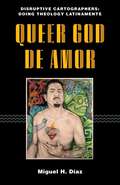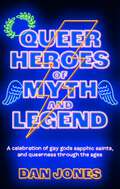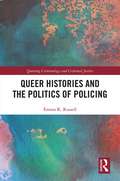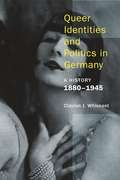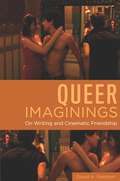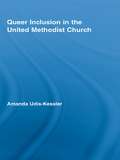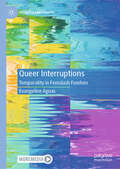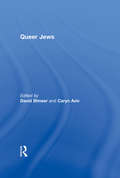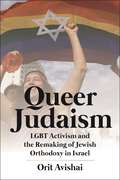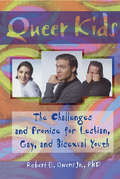- Table View
- List View
Queer Epistemologies in Education: Luso-Hispanic Dialogues and Shared Horizons (Queer Studies and Education)
by Moira Pérez Gracia Trujillo-BarbadilloThis edited collection brings together the work of researchers and educators from Argentina, Brazil, Spain, Colombia, Costa Rica, Portugal,and Mexico on education, pedagogy, and research from a queer perspective. It offers a space for the dissemination and development of new lines of analysis and intervention in the field of Queer Pedagogies in the region, relevant to the present and future of the field both in our countries and beyond. Chapters provide perspectives aware of the regional context but relevant from a theoretical and practical perspective beyond Ibero-America. The volume covers elementary, middle, and higher education, formal and informal, and includes theoretical and applied contributions on a variety of topics including public policies on education, queer youth, sex education, and conservative attacks against "gender ideology" in the region.
Queer European Cinema: Queering Cinematic Time and Space
by Leanne DawsonQueer European Cinema commences with an overview of LGBTQ representation throughout cinematic history, interwoven with socio-political reality in Europe and beyond, to consider trends including the boarding school film, the gay road movie, and queer horror such as the lesbian vampire tale, before analysing case studies from the ‘low culture’ of pornography to the ‘high culture’ of arthouse cinema. This collection of essays explores borders and boundaries of geography, temporality, ethnicity, class, gender, sexuality, and desire in a range of European films at a time when both LGBTQ politics and the concept of Europe are under intense scrutiny in representation and reality, to demonstrate how LGBTQ film can serve as a political tool to create visibility and acceptance as well as providing entertainment. Chapters include an analysis of both trans and femme identities in Academy Award-winning Boys Don’t Cry alongside German film, Unveiled; the intersection of lesbian visibility and the notion of nation on the Croatian screen at its point of entry into the European Union and during the gay marriage referendum; music and its relation to camp in Italian transnational cinema; European lesbian feminist pornography; and an analysis of liminal spaces and citizenship in queer French-language road movies. This book was originally published as a special issue of Studies in European Cinema.
Queer Experimental Literature
by Tyler BradwayThis volume argues that postwar writers queer the affective relations of reading through experiments with literary form. Tyler Bradway conceptualizes "bad reading" as an affective politics that stimulates queer relations of erotic and political belonging in the event of reading. These incipiently social relations press back against legal, economic, and discursive forces that reduce queerness into a mode of individuality. Each chapter traces the affective politics of bad reading against moments when queer relationality is prohibited, obstructed, or destroyed--from the pre-Stonewall literary obscenity debates, through the AIDS crisis, to the emergence of neoliberal homonormativity and the gentrification of the queer avant-garde. Bradway contests the common narrative that experimental writing is too formalist to engender a mode of social imagination. Instead, he illuminates how queer experimental literature uses form to redraw the affective and social relations that structure the heteronormative public sphere. Through close readings informed by affect theory, Queer Experimental Literature offers new perspectives on writers such as William S. Burroughs, Samuel R. Delany, Kathy Acker, Jeanette Winterson, Eve Kosofsky Sedgwick, Alison Bechdel, and Chuck Palahniuk. Queer Experimental Literature ultimately reveals that the recent turn to affective reading in literary studies is underwritten by a para-academic history of bad reading that offers new idioms for understanding the affective agencies of queer aesthetics.
Queer Families and Relationships After Marriage Equality (After Marriage Equality)
by Angela Jones Joseph Nicholas DeFilippis Michael W. YarbroughAfter years of intense debate, same-sex marriage has become a legal reality in many countries around the globe. As same-sex marriage laws spread, Queer Families and Relationships After Marriage Equality asks: What will queer families and relationships look like on the ground? Building on a major conference held in 2016 entitled "After Marriage: The Future of LGBTQ Politics and Scholarship," this collection draws from critical and intersectional perspectives to explore this question. Comprising academic papers, edited transcripts of conference panels, and interviews with activists working on the ground, this collection presents some of the first works of empirical scholarship and first-hand observation to assess the realities of queer families and relationships after same-sex marriage. Including a number of chapters focused on married same-sex couples as well as several on other queer family types, the volume considers the following key questions: What are the material impacts of marriage for same-sex couples? Is the spread of same-sex marriage pushing LGBTQ people toward more "normalized" types of relationships that resemble heterosexual marriage? And finally, how is the spread of same-sex marriage shaping other queer relationships that do not fit the marriage model? By presenting scholarly research and activist observations on these questions, this volume helps translate queer critiques advanced during the marriage debates into a framework for ongoing critical research in the after-marriage period.
Queer Families in Hungary: Same-Sex Couples, Families of Origin, and Kinship (Palgrave Macmillan Studies in Family and Intimate Life)
by Rita Béres-DeákSet against the backdrop of a country which upholds a heteronormative and narrow view of family, this book provides insights into the lives of Hungarian same-sex couples and their heterosexual relatives. Béres-Deák utilizes the theoretical framework of intimate citizenship, as well as findings from ethnographic interviews, participant observation and online sources. Instead of emphasizing the divide between non-heterosexual people and their heterosexual kin, the author recognizes that these members of queer families share many similar experiences and challenges.Queer Families in Hungary looks at experiences of coming out, negotiation of visibility, and kinship practices, and offers valuable insights into how individuals and families can resist heterosexist constraints through their discourses and practices. Students and scholars researching kinship studies, LGBT and queer studies, post-socialist studies, and citizenship studies, will find this book of interest.
Queer Families, Common Agendas: Gay People, Lesbians, and Family Values
by Richard SullivanVital information on family services, custody, and access rights for gay parents!Queer Families, Common Agendas: Gay People, Lesbians, and Family Values examines the real life experience of those affected by current laws and policies regarding homosexual families. The book will help policy makers, lawyers, social workers, and the general public better understand these families. Here you will be able to compare the progress of policy in the U.S. and Canada for gay and lesbian parents and their children and explore relevant legal approaches in the two countries. In Queer Families, Common Agendas: Gay People, Lesbians, and Family Values, a range of strategies for advancing the rights of sexual minority parents are considered for legal feasibility and political viability. You will gain insight into the contradictions in policies and practices that ultimately disadvantage children based on their family origins, and you will discover alternative approaches for improved services to homosexual families. Queer Families, Common Agendas explores: family law and protection of women-headed households legal definitions of motherhood and fatherhood in the United States, Canada, and the United Kingdom family and adoption idealogies concerning gay families and their rights to adopt new ways to make social services responsive to minority families the lesbian and gay “agenda” the value of family and the family of values--as opposed to the worn-out phrase “family values” Queer Families, Common Agendas serves as a primer to assist you in understanding the legal struggles that lesbian and gay families are facing today. You will explore concerns about family law, protection of women-headed households, motherhood, fatherhood, adoption and family ideology, and how to make social services responsive to gay and lesbian families. This excellent reference provides you with the necessary background and techniques to create services that are responsive and effective with sexual minority families.
Queer Folk Tales: A Book of LGBTQ Stories
by Kevin WalkerThe prince no longer kisses the princess, Cinderella helps her new husband to pick a new dress and the relationship between Mr Wolf and the three little pigs is a bit more complicated than you might have thought. In this collection of delightful, empowering and often magical tales, Kevin Walker creates and adapts a host of stories for the LGBTQ+ community. These sometimes traditional and sometimes modern tales show queer people that they belong not only in today’s world, but also in a storytelling tradition going back centuries, if not millennia. This is a wonderful collection for LGBTQ+ readers of all ages to enjoy and continue to tell for years to come, introducing characters who are romantic, brave, mysterious or fantastical – but always authentic.
Queer Forms
by Ramzi FawazHow do we represent the experience of being a gender and sexual outlaw? In Queer Forms, Ramzi Fawaz explores how the central values of 1970s movements for women’s and gay liberation—including consciousness-raising, separatism, and coming out of the closet—were translated into a range of American popular culture forms. Throughout this period, feminist and gay activists fought social and political battles to expand, transform, or wholly explode definitions of so-called “normal” gender and sexuality. In doing so, they inspired artists, writers, and filmmakers to invent new ways of formally representing, or giving shape to, non-normative genders and sexualities. This included placing women, queers, and gender outlaws of all stripes into exhilarating new environments—from the streets of an increasingly gay San Francisco to a post-apocalyptic commune, from an Upper East Side New York City apartment to an all-female version of Earth—and finding new ways to formally render queer genders and sexualities by articulating them to figures, outlines, or icons that could be imagined in the mind’s eye and interpreted by diverse publics. Surprisingly, such creative attempts to represent queer gender and sexuality often appeared in a range of traditional, or seemingly generic, popular forms, including the sequential format of comic strip serials, the stock figures or character-types of science fiction genre, the narrative conventions of film melodrama, and the serialized rhythm of installment fiction. Through studies of queer and feminist film, literature, and visual culture including Mart Crowley’s The Boys in the Band (1970), Armistead Maupin’s Tales of the City (1976–1983), Lizzy Borden’s Born in Flames (1983), and Tony Kushner’s Angels in America (1989–1991), Fawaz shows how artists innovated in many popular mediums and genres to make the experience of gender and sexual non-conformity recognizable to mass audiences in the modern United States.Against the ideal of ceaseless gender and sexual fluidity and attachments to rigidly defined identities, Queer Forms argues for the value of shapeshifting as the imaginative transformation of genders and sexualities across time. By taking many shapes of gender and sexual divergence we can grant one another the opportunity to appear and be perceived as an evolving form, not only to claim our visibility, but to be better understood in all our dimensions.
Queer Freedom : Black Sovereignty (SUNY series, Afro-Latinx Futures)
by Ana-Maurine Lara2021 CHOICE Outstanding Academic TitleWinner of the 2021 Gregory Bateson Book Prize presented by the Society for Cultural AnthropologyWinner of the 2020 Ruth Benedict Prize presented by the Association for Queer AnthropologyTheoretically wide-ranging and deeply personal and poetic, Queer Freedom : Black Sovereignty is based on more than three years of fieldwork in the Dominican Republic. Ana-Maurine Lara draws on her engagement in traditional ceremonies, observations of national Catholic celebrations, and interviews with activists from peasant, feminist, and LGBT communities to reframe contemporary conversations about queerness and blackness. The result is a rich ethnography of the ways criollo spiritual practices challenge gender and racial binaries and manifest what Lara characterizes as a shared desire for decolonization.Queer Freedom : Black Sovereignty is also a ceremonial ofrenda, or offering, in its own right. At its heart is a fundamental question: How can we enable "queer : black" life in all its forms, and what would it mean to be "free : sovereign" in the twenty-first century? Calling on the reader to join her in exploring possible answers, Lara maintains that the analogy between these terms—queerness and blackness, freedom and sovereignty—is necessarily incomplete and unresolved, to be determined only by ongoing processes of embodied, relational knowledge production. Queer Freedom : Black Sovereignty thus follows figures such as Sylvia Wynter, María Lugones, M. Jacqui Alexander, Édouard Glissant, Mark Rifkin, Gloria Anzaldúa, and Audre Lorde in working to theorize a potential roadmap to decolonization.
Queer French: Globalization, Language, and Sexual Citizenship in France (Contemporary French And Francophone Cultures Ser. #44)
by Denis M. ProvencherIn this book Denis M. Provencher examines the tensions between Anglo-American and French articulations of homosexuality and sexual citizenship in the context of contemporary French popular culture and first-person narratives. In the light of recent political events and the perceived hegemonic role of US forces throughout the world, an examination of the French resistance to globalization and 'Americanization', is timely in this context. He argues that contemporary French gay and lesbian cultures rely on long-standing French narratives that resist US models of gay experience. He maintains that French gay experiences are mitigated through (gay) French language that draws on several canonical voices - including Jean Genet and Jean-Paul Sartre - and various universalistic discourses. Drawing on material from a diverse array of media, Queer French draws out the importance of a French gay linguistic and semiotic tradition that emerges in contemporary textual practices and discourses as they relate to sexual citizenship in 20th- and 21st-century France. It will appeal to an interdisciplinary readership in gender and sexuality studies, cultural studies, linguistics, media and communication studies and French studies.
Queer Futures: Reconsidering Ethics, Activism, and the Political (Queer Interventions)
by Eveline Kilian Elahe Haschemi Yekani Beatrice MichaelisFollowing debates surrounding the anti-social turn in queer theory in recent years, there has been a renewed interest in the role of activism, the limits of the political, and the question of normativity and ethics. Queer Futures engages with these concerns, exploring issues of complicity and agency with a central focus on the material and economic as well as philosophical dimensions of sexual politics. Presenting some of the latest research in queer theory, this book draws together diverse perspectives to shed light on possible ’queer futures’ when different affective, temporal, and local contexts are brought into play. As such, it will appeal to scholars of cultural, political, literary, and social theory, as well as those with interests in gender and sexuality, activism, and queer theory.
Queer Game Studies
by Adrienne Shaw Bonnie RubergVideo games have developed into a rich, growing field at many top universities, but they have rarely been considered from a queer perspective. Immersion in new worlds, video games seem to offer the perfect opportunity to explore the alterity that queer culture longs for, but often sexism and discrimination in gamer culture steal the spotlight. Queer Game Studies provides a welcome corrective, revealing the capacious albeit underappreciated communities that are making, playing, and studying queer games.These in-depth, diverse, and accessible essays use queerness to challenge the ideas that have dominated gaming discussions. Demonstrating the centrality of LGBTQ issues to the gamer world, they establish an alternative lens for examining this increasingly important culture. Queer Game Studies covers important subjects such as the representation of queer bodies, the casual misogyny prevalent in video games, the need for greater diversity in gamer culture, and reading popular games like Bayonetta, Mass Effect, and Metal Gear Solid from a queer perspective. Perfect for both everyday readers and instructors looking to add diversity to their courses, Queer Game Studies is the ideal introduction to the vast and vibrant realm of queer gaming. Contributors: Leigh Alexander; Gregory L. Bagnall, U of Rhode Island; Hanna Brady; Mattie Brice; Derek Burrill, U of California, Riverside; Edmond Y. Chang, U of Oregon; Naomi M. Clark; Katherine Cross, CUNY; Kim d&’Amazing, Royal Melbourne Institute of Technology; Aubrey Gabel, U of California, Berkeley; Christopher Goetz, U of Iowa; Jack Halberstam, U of Southern California; Todd Harper, U of Baltimore; Larissa Hjorth, Royal Melbourne Institute of Technology; Chelsea Howe; Jesper Juul, Royal Danish Academy of Fine Arts; merritt kopas; Colleen Macklin, Parsons School of Design; Amanda Phillips, Georgetown U; Gabriela T. Richard, Pennsylvania State U; Toni Rocca; Sarah Schoemann, Georgia Institute of Technology; Kathryn Bond Stockton, U of Utah; Zoya Street, U of Lancaster; Peter Wonica; Robert Yang, Parsons School of Design; Jordan Youngblood, Eastern Connecticut State U.
Queer Globalizations: Citizenship and the Afterlife of Colonialism (Sexual Cultures #9)
by Arnaldo Cruz-Malavé MARTIN F. MANALANSAN IVScholars of postcolonial and LGBT studies examine the validity of the globalization of queer culturesGlobalization has a taste for queer cultures. Whether in advertising, film, performance art, the internet, or in the political discourses of human rights in emerging democracies, queerness sells and the transnational circulation of peoples, identities and social movements that we call "globalization" can be liberating to the extent that it incorporates queer lives and cultures. From this perspective, globalization is seen as allowing the emergence of queer identities and cultures on a global scale. The essays in Queer Globalizations bring together scholars of postcolonial and lesbian and gay studies in order to examine from multiple perspectives the narratives that have sought to define globalization. In examining the tales that have been spun about globalization, these scholars have tried not only to assess the validity of the claims made for globalization, they have also attempted to identify the tactics and rhetorical strategies through which these claims and through which global circulation are constructed and operate. Contributors include Joseba Gabilondo, Gayatri Gopinath, Janet Ann Jakobsen, Miranda Joseph, Katie King, William Leap, Lawrence LaFountain-Stokes, Bill Maurer, Cindy Patton, Chela Sandoval, Ann Pellegrini, Silviano Santiago, and Roberto Strongman.
Queer God de Amor (Disruptive Cartographers: Doing Theology Latinamente)
by Miguel H. DíazQueer God de Amor explores the mystery of God and the relationship between divine and human persons. It does so by turning to the sixteenth-century writings of John of the Cross on mystical union with God and the metaphor of sexual relationship that he uses to describe this union. Juan’s mystical theology, which highlights the notion of God as lover and God’s erotic-like relationship with human persons, provides a fitting source for rethinking the Christian doctrine of God, in John’s own words, as “un no sé qué,” “an I know not what.”In critical conversations with contemporary queer theologies, it retrieves from John a preferential option for human sexuality as an experience in daily life that is rich with possibilities for re-sourcing and imagining the Christian doctrine of God. Consistent with other liberating perspectives, it outs God from heteronormative closets and restores human sexuality as a resource for theology. This outing of divine queerness—that is, the ineffability of divine life—helps to align reflections on the mystery of God with the faith experiences of queer Catholics. By engaging Juan de la Cruz through queer Latinx eyes, Miguel Díaz continues the objective of this series to disrupt the cartography of theology latinamente.
Queer Heroes of Myth and Legend: A celebration of gay gods, sapphic saints, and queerness through the ages
by Dan JonesHidden in the margins of history books, classical literature, and thousands of years of stories, myths and legends, through to contemporary literature, TV and film, there is a diverse and other-worldly super community of queer heroes to discover, learn from, and celebrate. Be captivated by stories of forbidden love like Patroclus & Achilles (explored in Madeleine Miller's bestseller Song of Achilles), join the cult of Antinous (inspiration for Oscar Wilde), get down with pansexual god Set in Egyptian myth, and fall for Zimbabwe's trans God Mawi. And from modern pop-culture, through Dan Jones's witty, upbeat style, learn more about 90s fan obsessions Xena: Warrior Princess and Buffy the Vampire Slayer, Neil Gaiman's American Gods and the BBC's Doctor Who. Queer Heroes of Myth & Legend brings to life characters who are romantic, brave, mysterious, and always fantastical. It is a magnificent celebration of queerness through the ages in all its legendary glory.
Queer Heroes of Myth and Legend: A celebration of gay gods, sapphic saints, and queerness through the ages
by Dan JonesHidden in the margins of history books, classical literature, and thousands of years of stories, myths and legends, through to contemporary literature, TV and film, there is a diverse and other-worldly super community of queer heroes to discover, learn from, and celebrate. Be captivated by stories of forbidden love like Patroclus & Achilles (explored in Madeleine Miller's bestseller Song of Achilles), join the cult of Antinous (inspiration for Oscar Wilde), get down with pansexual god Set in Egyptian myth, and fall for Zimbabwe's trans God Mawi. And from modern pop-culture, through Dan Jones's witty, upbeat style, learn more about 90s fan obsessions Xena: Warrior Princess and Buffy the Vampire Slayer, Neil Gaiman's American Gods and the BBC's Doctor Who. Queer Heroes of Myth & Legend brings to life characters who are romantic, brave, mysterious, and always fantastical. It is a magnificent celebration of queerness through the ages in all its legendary glory.
Queer Histories and the Politics of Policing (Queering Criminology and Criminal Justice)
by Emma K. RussellDespite ongoing challenges to the criminalisation and surveillance of queer lives, police leaders are now promoted as allies and defenders of LGBT rights. However, in this book, Emma K. Russell argues that the surface inclusion of select LGBT identities in the protective aspirations of the law is deeply tenuous and conditional, and that police recognition is both premised upon and reproductive of an imaginary of' 'good queer citizens'—those who are respectable, responsible, and 'just like' their heterosexual counterparts. Based on original empirical research, Russell presents a detailed analysis of the political complexities, compromises, and investments that underpin LGBT efforts to achieve sexual rights and protections. With a historical trajectory that spans the so-called 'decriminalisation' era to the present day, she shows how LGBT activists have both resisted and embraced police incursions into queer space, and how—with LGBT support—police leaders have re-crafted histories of violence as stories of institutional progress. Queer Histories and the Politics of Policing advances broader understandings of the nature of police power and the shifting terrain of sexual citizenship. It will be of interest to students and researchers of criminology, sociology, and law engaged in studies of policing, social justice, and gender and sexuality.
Queer Identities and Politics in Germany: A History, 1880–1945
by Clayton WhisnantGermany in the late nineteenth and early twentieth centuries witnessed key developments in LGBT history, including the growth of the world's first homosexual organizations and gay and lesbian magazines, as well as an influential community of German sexologists and psychoanalysts. Queer Identities and Politics in Germany describes these events in detail, from vibrant gay social scenes to the Nazi persecution that sent many LGBT people to concentration camps.Clayton J. Whisnant recounts the emergence of various queer identities in Germany from 1880 to 1945 and the political strategies pursued by early homosexual activists. Drawing on recent English and German-language scholarship, he enriches the debate over whether science contributed to social progress or persecution during this period, and he offers new information on the Nazis' preoccupation with homosexuality. The book's epilogue locates remnants of the pre-1945 era in Germany today.
Queer Imaginings: On Writing and Cinematic Friendship (Queer Screens)
by David A. GerstnerHow do we identify the "queer auteur" and their queer imaginings? Is it possible to account for such a figure when the very terms "queer" and "auteur" invoke aesthetic surprises and disorientations, disconcerting ironies and paradoxes, and biographical deceits and ambiguities? In eighteen eloquent chapters, David A. Gerstner traces a history of ideas that spotlight an ever-shifting terrain associated with auteur theory and, in particular, queer-auteur theory. Engaging with the likes of Oscar Wilde, Walter Benjamin, James Baldwin, Jean Louis Baudry, Linda Nochlin, Jane Gallop, Cáel Keegan, Luce Irigaray, and other prominent critical thinkers, Gerstner contemplates how the queer auteur in film theory might open us to the work of desire. Queer Imaginings argues for a queer-auteur in which critical theory is reenabled to reconceptualize the auteur in relation to race, gender, sexuality, and desire. Gerstner succinctly defines the contours of a history and the ongoing discussions that situate queer and auteur theories in film studies. Ultimately, Queer Imaginings is a journey in shared pleasures in which writing for and about cinema makes way for unanticipated cinematic friendships.
Queer Inclusion in the United Methodist Church (New Approaches in Sociology)
by Amanda Udis-KesslerThe United Methodist Church has been in conflict over lesbian/gay/bisexual/transgender inclusion issues since 1972. That year, in response to the gay liberation and gay rights movements, wording was added to the UMC Book of Discipline (the compilation of denominational policies and doctrines) characterizing homosexuality as "incompatible with Christian teaching." Since then, United Methodist ministers have been forbidden to perform same-sex commitment ceremonies (and United Methodist churches forbidden to host them), a rule has been passed that non-heterosexual United Methodist ministers must be celibate, and the UMC has forbidden the funding of any program or organization "supporting" homosexuality. These policies have been met with significant resistance by those fighting for GLBT inclusion. In this groundbreaking book, Udis-Kessler examines this struggle, analyzing both sides of this divisive debate among one of the most prominent religious organizations in the United States.
Queer Inclusions, Continental Divisions: Public Recognition of Sexual Diversity in Canada and the United States
by David RaysideNo area of public policy and law has seen more change than lesbian, gay, bi-sexual, and trans-gender rights, and none so greatly needs careful comparative analysis. Queer Inclusions, Continental Divisions explores the politics of sexual diversity in Canada and the United States by analyzing three contentious areas - relationship recognition, parenting, and schooling. It enters into long-standing debates over Canadian-American contrasts while paying close attention to regional differences. David Rayside's examination of change over time in the public recognition of sexual minorities is based on his long experience with the analysis of trends, as well as on a wide-ranging search of media, legal, and social science accounts of developments across Canada and the United States. Rayside points to a 'take off' pattern in Canadian policy change on relationship recognition and parenting, but not in schooling. At the same time, he explores the reasons for a 'pioneering' pattern in early gains by American LGBT activists, a surprising number of court wins by American lesbian and gay parents, and changes in American schooling that, while still modest, are more substantial than those instituted by the Canadian system. Queer Inclusions, Continental Divisions is a timely examination of controversial policy areas in North America and a reasoned judgment on the progress of lesbian and gay issues in our time.
Queer Interruptions: Temporality in Femslash Fandom (Palgrave Fan Studies)
by Evangeline AguasThis book explores the experiences of queer female and genderqueer fans through interviews and an original documentary. Inspired by fan reactions to the death of a popular lesbian character on the television series The 100 (2014–2020), the book focuses on the fans’ experiences with the “Bury Your Gays” trope and seeks to illustrate the enduring impact of these fi ctional deaths on contemporary viewers. The book draws on queer theory to frame the experiences of queer female and genderqueer fans as experiences of queer time: as deviations from heteronormative life timelines, as anachronistic backward turns, and as queer melancholia. By exploring the “backward” feelings and experiences of fans, this book illustrates how the pain and abjection of the queer past are still with us in the present, challenging simplistic narratives of progress and highlighting the continuing marginalisation of the queer community onscreen and in the wider political context.
Queer Jews
by David Shneer Caryn AvivQueer Jews describes how queer Jews are changing Jewish American culture, creating communities and making room for themselves, as openly, unapologetically queer and Jewish. Combining political analysis and personal memoir, these essays explore the various ways queer Jews are creating new forms of Jewish communities and institutions, and demanding that Jewish communities become more inclusive.
Queer Judaism: LGBT Activism and the Remaking of Jewish Orthodoxy in Israel
by Orit AvishaiOffers a compelling look at how Orthodox Jewish LGBT persons in Israel became more accepted in their communities.Until fairly recently, Orthodox people in Israel could not imagine embracing their LGBT sexual or gender identity and staying within the Orthodox fold. But within the span of about a decade and a half, Orthodox LGBT people have forged social circles and communities and become much more visible. This has been a remarkable shift in a relatively short time span. Queer Judaism offers the compelling story of how Jewish LGBT persons in Israel created an effective social movement.Drawing on more than 120 interviews, Orit Avishai illustrates how LGBT Jews accomplished this radical change. She makes the case that it has taken multiple approaches to achieve recognition within the community, ranging from political activism to more personal interactions with religious leaders and community members, to simply creating spaces to go about their everyday lives. Orthodox LGBT Jews have drawn from their lived experiences as well as Jewish traditions, symbols, and mythologies to build this movement, motivated to embrace their sexual identity not in spite of, but rather because of, their commitment to Jewish scripture, tradition, and way of life. Unique and timely, Queer Judaism challenges popular conceptions of how LGBT people interact and identify with conservative communities of faith.
Queer Kids: The Challenges and Promise for Lesbian, Gay, and Bisexual Youth
by Robert E OwensPacked to the hilt with living narratives, scholarly research, and problem-solution scenarios, Queer Kids: The Challenges and Promise for Lesbian, Gay, and Bisexual Youth examines the unique challenges faced by today’s homosexual young adults. You’ll learn what modern-day queer kids do to cope, survive, and find understanding in a world riddled with homophobic intolerance. Queer Kids is a lens of clarity that will help the average straight adult--and maybe even the average gay adult--see things from a kid’s point of view. Its detail-oriented, well-wrought chapters will provide you with literally hundreds of stories of young people who are trying to define themselves sexually and emotionally in a society of criss-crossing judgment, stereotyping, anger, and expectation. Aimed at three target groups--counselors, parents, and youth--this book introduces you to a variety of interesting kids, offers you a look at the process of coming out, and helps you grasp the experience of queer identification. Specifically, you’ll read about: queer kids and their families and peers the medical/health care profession’s impact on queer kids the teachers and counselors of gay, lesbian, and bisexual youth how to alleviate harrassment, abuse, withdrawal, and loneliness the effects of familial denial, prejudiced counselors, and standoffish gay adultsBeing a kid is tough--but being a queer kid can be even tougher. Fortunately, Queer Kids is available for students, ministers, teachers, youth- and health-care workers, and especially the friends and families of teens who are working through the personal turbulence that too often accompanies sexual and emotional definition. Guided by its upfront approach and practical resource list of written, computer, and telephone aids, you’ll see that a solution is not as distant as you think. Read it, and relearn what it means to be a kid again.
